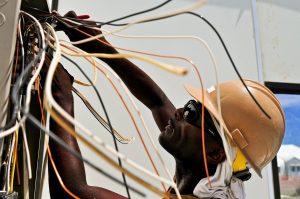Electrical contracting is a huge industry with more than $130 billion in annual revenue.
The industry has more than 70,000 electrical contracting firms and more than 650,000 electricians in the U.S.
And the people behind it, the electrical contractors, will…
- Provide electrical installation, servicing, maintenance, and repair services to residential, commercial, or industrial customers
- Deliver communications and power to homes, businesses, and service providers
Not all electricians will want to be electrical contractors, but those who do have the ambition to own their businesses.
So if you want to be your own boss, this page will provide helpful insights into your journey toward becoming a licensed electrical contractor.
What Electrical Contractors Do
Electrical contractors design, install and maintain communications and electrical systems.
The business may either be a multi-area contracting firm or a small firm with only a few employees.
It may even only have you, the boss, as both the owner and employee.
Commonly, the work of a contractor or a contracting firm is related to the following areas:
- Outside/line contracting
This work involves high-voltage distribution and power transmission lines.
Contractors working in this area focus on substations, power plants, and high-voltage lines.
- Inside contracting
Inside contracting work is related to homes, buildings, and other structures’ wiring.
Contractors perform primarily cabling and electrical design, installation, and maintenance.
- Integrated building systems (IBS)/voice data video (VDV)
This work covers installations, maintenance, and repair of low-voltage systems.
Contractors usually work with systems such as:
- Security systems
- Back-up power
- Energy-efficient lighting
- Climate control
- Wireless networks
- Telecommunications
- Fiber optics
Projects Electrical Contractors Handle
Electrical contractors work on various large and small-scale projects.
They usually take on the following:
Commercial and Industrial Projects
For these projects, they will design and install electrical panels, wiring, switchgear, systems, and related equipment, such as switches, lighting fixtures, and receptacles.
Some of the clients who usually hire them for these projects are as follows:
- Schools
- Office buildings
- Hospitals
- Factories
- Distribution centers
- Assembly plants
To obtain such a large project, contractors would bid competitively for them.
Commonly, they work as specialty subcontractors under a general contractor.
Sometimes, they can work directly for the owner of the building as a part of a design-build team.
Depending on the scale and scope, they can complete these projects in a few months or even years.
Service and Maintenance Jobs
Here, electrical contractors will provide repair and service to commercial and residential clients.
These services are usually completed during a single visit.
Typically, they are paid for on a cost-plus-fee basis or flat fee schedule.
Some contractors also make recurring contracts with clients for preventative maintenance of their electrical systems.
Residential Projects
Work in the residential sector has become quite profitable for many contractors in recent years.
The reason lies in the technologies residents want to integrate into their homes, like security or entertainment systems.
In these projects, contractors usually perform the following work:
- Upgrade systems in home offices or home theaters
- Install automated environmental control
- Upgrade electrical panels
- Relocate electrical receptacles
- Install new lightings
Becoming an Electrical Contractor
The regulations and laws for electrical contractor licensing can vary from one jurisdiction to another.
But the general process is the same: become a licensed master electrician to be eligible for a contractor’s license.
To become a master electrician, you need to do the following:
- Complete an electrician apprenticeship
Start off as an apprentice working directly under the supervision of a licensed electrician.
- Meet state requirements for journeyman electrician license
To be eligible for the journeyman electrician license, most jurisdictions will require that you…
- Complete the education and experience requirements as an apprentice
- At least 500 to 1,000 classroom hours
- At least 8,000 to 10,000 practical hours
- Pass the journeyman electrician licensure exam
- Complete the education and experience requirements as an apprentice
- Qualify to earn a master electrician license
To be eligible for the master electrician license, most jurisdictions will require you to have at least two years (4,000 hours) of journeyman experience.
Once you have the license, you can apply for the independent electrical contractor’s license.
Applying for an Electrical Contractor’s License
Any master electrician can apply for an electrical contractor’s license.
However, it’s essential to understand the primary difference between these two licenses.
An electrical contractor license is a business license, while a master electrician is a professional license.
So you can’t hold a contractor’s license without becoming a master electrician first.
However, there are exceptions in some states.
For example:
- In Texas, you can apply for an electrical contractor’s license if you have at least one licensed master electrician on staff.
- In Colorado, any firm fully or partially owned by a master electrician can obtain an electrical contractor registration.
The majority of states license contractors at the state level.
Others, however, such as Illinois, leave it up to municipalities to issue licensing registrations.
License Requirements
There is a set of requirements you should meet to be eligible for a contractor’s license.
Many of them require you to pass an examination and meet certain experience requirements.
For instance, New Jersey issues contractor licenses to individuals or firms with proof of a minimum of five years of practice in electrical construction and installation.
Some states provide electricians with a few options for working as electrical contractors.
In Florida, electrical contractors can register locally.
For that, they need to file evidence of a current occupational license and meet the local examination and licensing requirements.
They can also be state-certified by taking and passing the examination for state licensing.
Liability Insurance
In most jurisdictions, electrical contractors should also receive a business permit and carry liability insurance.
For instance, in Texas, electrical contractors should carry a minimum of…
- $600,000 aggregate
- $300,000 per occurrence
- $300,000 aggregate for products and completed operations
License Renewal
Generally, you need to renew your license once every two years.
You may have to meet some continuing education requirements to renew it.
For instance, in Florida, contractors should complete a minimum of 14 hours of Board-approved continuing education every two years.
This page is also available in Spanish.










